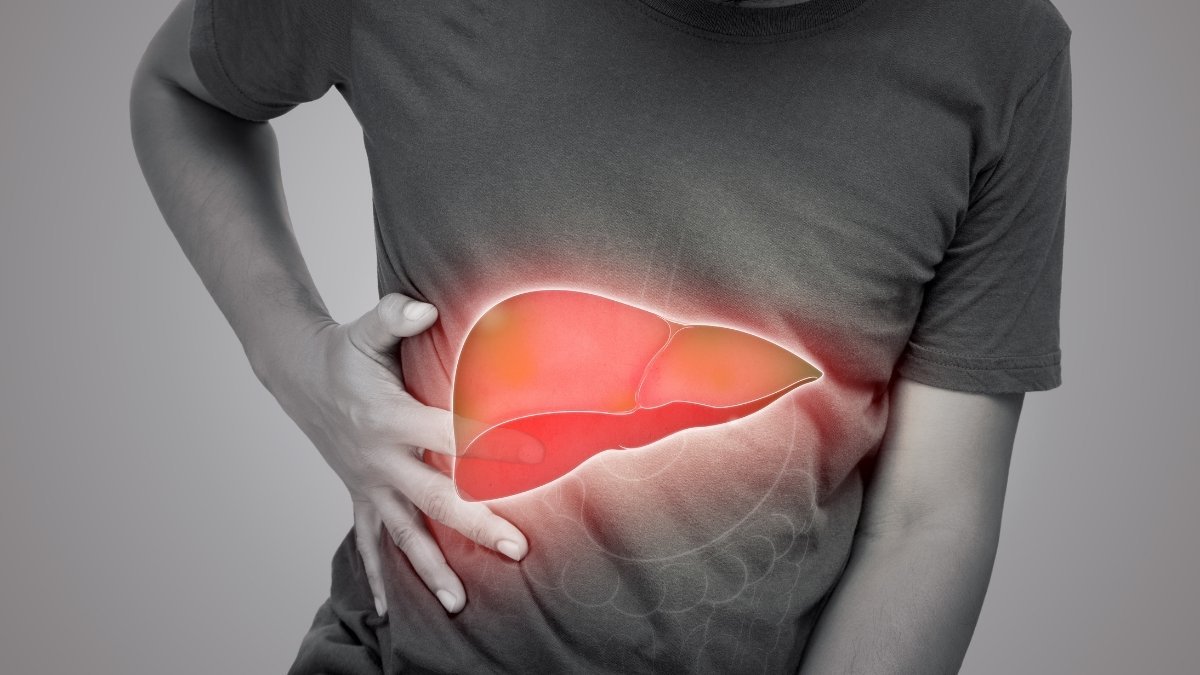The clock reads 3 AM, and you’re wide awake. Again. This isn’t just a random glitch in your sleep; it’s a frustrating pattern that wrecks your next day, leaving you tired and irritable.
You’ve probably blamed stress or a bad mattress, but the real reason might be a quiet signal from your body that something is out of balance. This guide will show you what that 3 AM alarm is really about. We’ll connect the dots between your liver, your stress levels, and your body’s internal clock.
You’ll learn why this happens and, more importantly, what you can do to finally sleep through the night and get your energy back.
Why Do I Keep Waking Up at 3 AM?

The 3 AM Problem Everyone Knows
It’s a feeling many people know too well. The house is quiet and dark, but you are wide awake for no reason. You look at the clock, and it’s 3 AM. For lots of people, this isn’t just a one-time thing.
It’s a frustrating pattern that makes them tired, grumpy, and unable to do their best the next day. Waking up at the same time every night isn’t random. It’s a sign that something inside your body needs a little help.
This is happening while many people are already not getting enough sleep. The CDC says more than one-third of American adults don’t get the sleep they need. This makes it hard to get through the day and is linked to many long-term health problems.
Waking up once in a while is normal. But if it’s always around 3 AM, your body is sending you a strong signal. This guide will break down the mystery. It’s not your fault. It’s a message you can learn to read.
The main idea is that waking up like this is tied to your liver, your hormones, and your stress. We can mix the old wisdom of Traditional Chinese Medicine (TCM) with modern science. This gives a clear picture. It shows you how to get back to the deep, solid sleep your body needs.
What an Ancient Chinese Clock Says About Your Liver
For thousands of years, Traditional Chinese Medicine has used a system called the Organ Clock. It’s a way to see how your body’s energy works through the day. The main idea is about Qi (pronounced “chee”), which is your body’s life energy.
TCM says Qi is always moving through pathways called meridians. These pathways connect to all your organs. The Organ Clock splits the 24-hour day into 12 parts, each two hours long. During each part, Qi is strongest in one specific organ.
This is when that organ does its main job of fixing and cleaning itself. If you keep waking up at the same time, TCM says there is a block or problem in that organ.
The time between 1 AM and 3 AM is “Liver Time.” In TCM, the Liver is very important. It’s like a general who makes sure the Qi flows smoothly everywhere in your body.
At night, its main jobs are to clean your blood, handle nutrients from food, and deal with emotions. When your Liver is healthy, you sleep deeply during this time. But if your Liver is overworked or its energy is stuck, it can’t do its job. This can physically wake you up.
If you drink too much alcohol or have a very frustrating day, your Liver gets overloaded. It struggles to clean your body and process your feelings, which can wake you up between 1 AM and 3 AM.
The problem isn’t just physical; it’s a mind-body issue. TCM says the Liver holds emotions like anger, frustration, and resentment. If you don’t deal with these feelings, they can block the flow of Qi.
This block is what messes with your sleep. So, your feelings can cause a physical problem that wakes you up. This changes the 3 AM wake-up from just a sleep issue to a bigger mind-body signal. Other signs of a stuck Liver Qi can be feeling tense, moody, having high blood pressure, or digestive problems.
Your Body’s Nightly Schedule (According to TCM)
To get the full picture, it helps to see the 3 AM liver signal as part of a bigger schedule. This table shows the main organs at work while you sleep.
It can help you spot other patterns. For example, if you have trouble relaxing at 10 PM (Triple Burner) or feel unsure about things (Gallbladder), it might be linked to the same stress that wakes you at 3 AM.
| Time Window | Organ System | What It Does in TCM | Feelings Tied to It | Signs of a Problem |
| 9 PM – 11 PM | Triple Burner | Manages hormones, metabolism, and body temperature. It’s not one single organ. | Joy or lack of joy, feeling down, hopelessness. | Hormone issues, tired adrenals, slow metabolism, headaches, fatigue, thyroid problems. |
| 11 PM – 1 AM | Gallbladder | Stores and releases bile for digestion, helps with making decisions, and is linked to dreams. It works closely with the Liver. | Can’t make decisions, bitterness, resentment. | Poor judgment, shyness, high cholesterol, bad dreams, weak tendons, trouble digesting fatty foods. |
| 1 AM – 3 AM | Liver | Cleans blood, processes emotions, stores blood, and keeps Qi flowing smoothly. | Anger, irritability, frustration, resentment, rage. | Angry outbursts, moodiness, high blood pressure, PMS, digestive issues, tension, migraines, blurry vision. |
| 3 AM – 5 AM | Lung | Manages breathing and the immune system. It also controls sweat and keeps skin moist. | Sadness, grief, holding in feelings. | Shortness of breath, fatigue, cough, getting sick often, allergies, asthma, dry skin, feeling sad, crying. |
The Science Behind Your Misfiring Body Clock

TCM gives a great big-picture view of the 3 AM wake-up. Modern science gives us the details. It shows the exact biological reasons this can happen. Science doesn’t argue with the old wisdom. It often explains the real-world processes behind it.
From a science view, waking at 3 AM isn’t caused by one thing. It’s a “perfect storm” where your body’s natural rhythms create a weak spot. Stress and your lifestyle can easily take advantage of it.
How Your Body’s Clocks Are Supposed to Work
Sleep isn’t just being “off.” It’s a process with different stages. During the night, your brain goes through these stages in 90-minute cycles. The stages include light sleep, deep sleep, and REM sleep, which is when you dream.
The pattern changes through the night. In the first half of the night, you get more deep sleep. This is when your body repairs itself. But in the second half of the night, after 2 or 3 AM, you spend more time in lighter sleep.
Because you’re in a lighter sleep, you are more likely to be woken up by anything, from a noise outside to a small change inside your body.
A master clock in your brain controls this nightly pattern. It keeps your body in sync with the 24-hour day. But that’s not the only clock. New research shows that almost every organ, like your liver, has its own clock.
These organ clocks listen to the master clock, but they also pay attention to things like when you eat. This is a lot like the TCM Organ Clock. It confirms that our organs have their own daily schedules for their peak work times.
Your liver’s clock, for example, controls genes that are key for breaking down food and cleaning toxins. Many of these jobs are most active while you sleep.
Is Stress the Reason You’re Waking Up?
A key reason for waking at 3 AM is cortisol, your main stress hormone. Cortisol isn’t bad. You need it to live. It has a daily rhythm. In a healthy person, cortisol is lowest around midnight, which helps you sleep deeply.
It starts to rise gently around 2 or 3 AM. It peaks in the morning to help you feel awake and ready for the day.
The problem starts when chronic stress messes up this rhythm. Long-term stress keeps your body’s stress system on high alert. This leads to a messed-up cortisol pattern.
Instead of a gentle rise before dawn, you might get a big, early spike of cortisol right around 3 AM. This hormone spike is like a powerful alarm clock inside you. Your heart rate and blood pressure go up.
Your brain is pulled out of light sleep and into a state of worry. This is why the 3 AM wake-up feels so sudden. It’s also why it’s so hard to get back to sleep. Your body is full of the hormone that’s designed to make you feel awake.
Could Low Blood Sugar Be the Problem?
Another powerful reason for a 3 AM wake-up is your liver’s job of managing blood sugar. All night, while you’re not eating, your liver keeps your blood sugar steady.
This feeds your brain and body. The liver stores sugar from your meals as glycogen. Then, it slowly releases that sugar back into your blood all night long.
But this system can get thrown off. Things like eating dinner early, having a meal full of carbs but low in protein, drinking alcohol before bed, or being on a very low-carb diet can use up the liver’s stored sugar too fast.
If your blood sugar drops too low during the night, your body treats it like an emergency. Your adrenal glands release emergency hormones, mostly adrenaline and cortisol. Their job is to tell the liver to make more sugar, fast.
This works to fix your blood sugar, but it’s also a strong wake-up call. It’s your body’s “fight-or-flight” response kicking in while you sleep. This is why many people who wake at 3 AM also feel their heart pounding, get night sweats, or feel shaky.
If you are stressed and also have shaky blood sugar, you’re setting a double alarm. The light sleep cycle makes you easy to wake.
The stress gives you an early cortisol jolt. Then, a blood sugar crash can add a second powerful surge of adrenaline and more cortisol. This makes staying asleep almost impossible.
The Liver: Where Old Wisdom and New Science Agree

The liver is the main character in the 3 AM wake-up story. It connects ancient ideas with modern science. Its jobs at night, its weakness to modern stress, and its link to our feelings create a clear, single reason for this common sleep problem.
When you look at both TCM and Western medicine, you see they are often talking about the same mind-body issue in different ways.
This view turns the 3 AM wake-up from just an annoying problem into an important sign from your body. It’s a “check engine light” that you should pay attention to.
Your Liver Works Hardest While You Sleep
The TCM idea that 1 AM to 3 AM is “Liver Time” isn’t just an old story. It lines up very well with modern science. Research shows the liver has a powerful internal clock that carefully controls its many jobs to match the day-night cycle.
During the day, when you eat, the liver is busy taking in nutrients. At night, when you are sleeping and not eating, it switches to different jobs. These nighttime duties include cleaning out toxins, making cholesterol, and managing sugar and fat to give you steady energy while you sleep.
So, while science doesn’t use the word Qi, it agrees that the liver is very busy during the exact hours TCM pointed to long ago. It does the same cleaning and processing jobs the old texts described.
This shows that sleep isn’t just rest for your brain. It’s a key time for organs like the liver to do heavy work. Waking up during this time gets in the way of the liver’s important maintenance.
The Vicious Cycle of a Stressed Liver and Poor Sleep
The link between liver health and sleep is real. Studies show that people with chronic liver disease often have terrible sleep. About 60-80% of patients with serious liver damage report poor sleep, including waking up a lot.
This is a growing problem because of Non-Alcoholic Fatty Liver Disease (NAFLD). This is when too much fat builds up in the liver. It now affects about 32% of adults around the world. Research shows NAFLD is linked to sleep problems.
This relationship goes both ways. It creates a bad cycle that’s hard to break. A sick liver can mess up sleep by changing how your body handles the sleep hormone melatonin. In bad cases, toxins can build up and affect the brain.
At the same time, bad sleep acts as a stressor that can hurt the liver. Not getting enough sleep messes with the liver’s daily rhythms. This can harm its ability to manage food, cause inflammation, and make conditions like NAFLD worse.
This two-way street means that waking at 3 AM might be more than just a bad night. It could be an early warning that your liver is under a lot of stress. Liver doctors now know how important it is to check for and treat sleep problems as part of taking care of the liver.
How Frustration Physically Affects Your Liver
The clearest link between TCM and science is the connection between feelings and the liver. TCM says the Liver “stores” anger and frustration you haven’t dealt with. We can see this through the lens of modern science.
It studies how your mind, nerves, and immune system connect. Science confirms that holding back emotions is not easy. It takes a lot of mental and physical energy.
When you constantly push down feelings like anger, your body’s “fight-or-flight” system stays on. This leads to long-term stress. You get higher stress hormones and inflammation, which are all results of a messed-up stress response.
This state of stress directly affects the liver. The liver is very sensitive to stress hormones, which can hurt its function over time.
Also, the idea of somatization helps explain this. Somatization is how stress shows up as physical problems. Feelings you don’t process don’t just disappear. They can turn into tension headaches, digestive issues, and bad sleep.
These are the same problems TCM has linked to a troubled Liver for a long time. The “stagnation” or block that TCM talks about is a good way to describe the physical traffic jam created by holding in your feelings.
Why You Wake Up – Two Views on the Same Problem
This table helps connect the dots. It translates the ideas of TCM into the language of modern science. This side-by-side look makes the TCM ideas easier to follow. It shows that both systems are often looking at the same mind-body problem from different angles.
| What’s Happening | The Traditional Chinese Medicine View | The Modern Science View |
| Waking at 1-3 AM with a racing mind, feeling irritable and tense. | Stuck Liver Qi. The Liver’s peak work time is blocked. Unresolved anger or stress has gotten the energy “stuck,” which wakes you up. | Messed-Up Stress Response & Early Cortisol Spike. Chronic stress makes your stress response overactive. The body’s gentle rise in cortisol at 2-3 AM becomes a big, early spike. This turns on your “fight-or-flight” system and wakes you up suddenly. |
| Waking at 1-3 AM feeling sweaty, shaky, or with a pounding heart. | Liver Blood/Yin Deficiency. The Liver doesn’t have enough resources to keep your spirit calm at night. This can be made worse by a poor diet. | Low Blood Sugar at Night & Adrenaline Rush. A bad diet (like a high-sugar dinner or alcohol) uses up the liver’s stored sugar. Blood sugar drops, which triggers an emergency release of adrenaline and cortisol to raise it. This hormone rush gives you a panicked wake-up call. |
| Always waking at 3 AM, plus digestive issues, fatigue, and moodiness. | Overworked Liver System. A mix of stress, a bad diet, and toxins has overloaded the Liver. It can’t do its jobs of cleaning, managing emotions, and keeping Qi flowing. | Strained Liver-Stress System & A Vicious Cycle. A mix of stress, bad sleep, and a poor diet creates a bad cycle. The stressed liver doesn’t work well, which messes up sleep. Bad sleep then stresses the liver even more, leading to more problems. |
How to Fix Your 3 AM Wake-Up Call

Knowing why you wake up at 3 AM is the first step. The next step is to do something about it. Since there are many causes, the fix needs to cover many areas.
A plan that looks at your diet, stress, sleep space, and emotional health is the best way to get back to peaceful nights. This section gives you a full toolkit of strategies from both science and old wisdom to help you answer your body’s call for balance.
How to Eat for a Happier Liver and Better Sleep
Your liver processes everything you eat and drink, so diet is key to its health. Eating in a way that supports your liver can make its job easier, help it clean your body, and stop the blood sugar swings that wake you up.
Eat Foods That Help Your Liver: A diet based on whole, natural foods gives your liver the tools it needs to work well. Try to eat more of these:
Cruciferous Veggies: Broccoli, cauliflower, and kale have things in them that help the liver’s cleaning enzymes.
Leafy Greens: Spinach and arugula are full of chlorophyll, which can help clear out toxins.
Berries and Colorful Fruits: These are full of antioxidants that protect liver cells.
Green Tea: It has antioxidants that support the liver and can reduce fat buildup.
Healthy Fats: Foods like avocado, olive oil, and nuts can help fight inflammation.
Give Your Liver a Break: Some foods make the liver work too hard. You should limit them, especially at night:
Alcohol: Alcohol is a toxin to the liver. Cutting back or stopping is one of the best things you can do for it.
Sugar and White Carbs: Too much sugar is a main cause of fatty liver disease. These foods also make your blood sugar unstable.
Processed and Fried Foods: These often have unhealthy fats and chemicals that your liver has to deal with.
Keep Your Blood Sugar Steady All Night: What and when you eat dinner is very important to stop low blood sugar at night.
Eat a Balanced Dinner: Make sure your last meal has good protein, healthy fats, and complex carbs (from veggies or whole grains). This gives you slow, steady energy all night.
Don’t Skip Dinner: Going to bed hungry makes a blood sugar crash more likely.
Think About a Bedtime Snack: If you often get low blood sugar, a small, protein-rich snack 30-60 minutes before bed can help. A few almonds or a spoonful of nut butter can keep your blood sugar stable.
If you have health issues or want a more specific plan, talking to a registered dietitian can be a huge help. They can look at what you need and make a meal plan just for you.
How to Calm Your System and Deal with Stress
A messed-up stress response is a main cause of the 3 AM cortisol spike. So, finding ways to calm your system down is a must-do. This means managing stress during the day and having ways to process your feelings.
Create a “Wind-Down” Routine: The hour before bed should be a screen-free time to transition. This tells your brain and body it’s time to switch from “doing” to “resting.” Good wind-down activities are:
Gentle Stretching or Yoga: This releases physical tension in your body.
Reading a Real Book: This helps you avoid the blue light from screens that keeps you awake.
Taking a Warm Bath or Shower: When your body cools down after, it helps you feel sleepy.
Try Mindfulness and Meditation: These are proven ways to calm your nervous system and lower cortisol. Just 10-15 minutes a day can make a big difference. Apps like Calm and Headspace have guided meditations for sleep that are easy to use.
Find a Way to Release Your Feelings: To deal with the held-in emotions that TCM links to the liver, you need an outlet.
Journaling: Before bed, take a few minutes to write in a “worry journal.” Write down anything that’s bothering you or on your to-do list. Getting it out on paper can help you let it go so it doesn’t pop up at 3 AM.
How to Set Up Your Bedroom for Great Sleep
Making your bedroom a perfect place for sleep is key. It can stop you from fully waking up when you’re in a light stage of sleep.
Control Light and Darkness: Light is the biggest signal for your body’s clock.
Morning Light: Get at least 15 minutes of sunlight in the first hour after you wake up. This sets your body clock for the day and helps cortisol drop correctly at night.
Evening Darkness: Make your bedroom as dark as you can. Use blackout curtains and cover any lights on electronics. A sleep mask can also help. Even a little light can stop your body from making melatonin.
Keep It Cool: Your body temperature needs to drop for you to fall asleep and stay asleep. The best room temperature is between 60-67°F (15-19°C).
Use the 20-Minute Rule: If you wake up at 3 AM, don’t just lie there getting frustrated. This makes you connect your bed with being awake. Sleep experts say if you can’t fall back asleep in about 20 minutes, get out of bed.15 Go to another room with dim light and do something calm, like reading a boring book. Only go back to bed when you feel sleepy again.
Other Tools That Can Help: Teas, Trackers, and Professionals
Some other tools can help you with these lifestyle changes. They offer gentle support and can show you what’s working.
Try Herbal Teas: Many people use herbal teas to help the liver and calm the nerves. You could try making a daily habit of drinking:
Chrysanthemum or Rose: Used in TCM to cool “Liver heat” and calm you down.
Dandelion Root: A popular herb known to help the liver clean itself.
Jujube Date: Used in TCM to calm the spirit.
Use Sleep Trackers the Right Way: Wearable devices like the Oura Ring or Whoop can be helpful, but they aren’t perfect. They aren’t great at measuring sleep stages. But they are good at tracking how long you sleep and your heart rate. This information can show you if your new diet or stress habits are helping your sleep over time.
Know When to Get Professional Help: Lifestyle changes are great, but if your sleep problems don’t go away, it could be a sign of a medical issue. It’s important to see a professional if the problem continues.
Your Doctor or a Liver Specialist: They can check for things like sleep apnea, liver disease, or hormone problems.
A Licensed Acupuncturist: They can give you a TCM plan. This might include acupuncture to unblock Liver Qi or herbs to balance the liver.
A Therapist or Counselor: They can teach you better ways to handle stress and work through feelings you’ve been holding in.
Your Personal Action Plan Checklist
This checklist makes all the advice in this guide simple and easy to follow. You can use it to help you build new habits for deep, restful sleep.
| Category | Action Item |
| DIET & NUTRITION | Eat a balanced dinner with protein, healthy fat, and complex carbs at least 3 hours before bed. |
| Eat a serving of leafy greens or cruciferous vegetables every day. | |
| Limit alcohol, sugar, and white carbs, especially at night. | |
| If you need it, have a small, protein-rich snack 30-60 minutes before bed. | |
| STRESS & EMOTIONAL HEALTH | Do 10 minutes of meditation or deep breathing every day. |
| Spend 5 minutes before bed writing down your worries. | |
| Have a consistent, screen-free “wind-down” hour before sleep. | |
| SLEEP ENVIRONMENT | Get at least 15 minutes of natural sunlight in the morning. |
| Keep your bedroom cool (60-67°F / 15-19°C). | |
| Make sure your bedroom is completely dark. | |
| If you’re awake for more than 20 minutes, get out of bed and do something calm. | |
| PROFESSIONAL SUPPORT | See your doctor if the problem lasts for more than a month. |
| Think about seeing an acupuncturist for a TCM approach. | |
| Think about working with a registered dietitian for a personal nutrition plan. |


